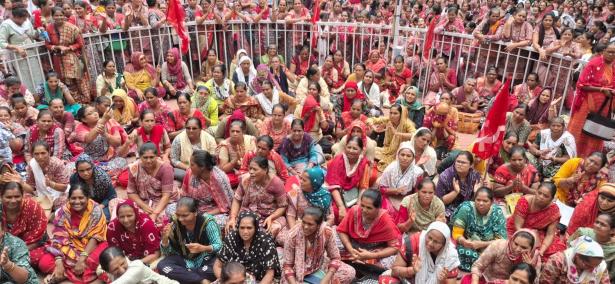- Myanmar Workers and Democratization
- General Strike in India
- Left Dialogue Proposal in Iran
- Justice For Japan’s “Comfort Women”
- The Role of the Left in Palestine’s History
- Bangladesh Since the Uprising
- Kurds Face Crackdown in Iran
- Repression in Hong Kong
- Philippines: Workers vs Union Busting
- China’s Labor Movement
__________
Myanmar Workers and Democratization
Stephen Campbell / Asian Labour Review (Seoul)
Workers’ self-organization is far more participatory than the very top-down, elitist form of electoral rule that was in place in Myanmar before the military seized power. For this reason, it offers a quite promising and hopeful political horizon that extends far beyond a restoration of the pre-coup status quo.
__________
General Strike in India
The Hindu (Mumbai)
On Wednesday, July 9, India is witnessing a nationwide general strike, or Bharat Bandh, called by central trade unions. The strike is in support of a 17-point charter of demands. Key demands include the rollback of the labour codes, a guaranteed minimum wage, pension for all, and a curb on privatisation.
__________
Left Dialogue Proposal in Iran
Hassan Mortazavi / The International Marxist-Humanist (Chicago)
If we cannot, in coordination with the regional left, form a united front; if we cling to delusions and fail to connect our limited resources with those of others in the region, then in the tumultuous and unpredictable times ahead, not only will the left disappear—it is likely that nothing will remain to be called human.
__________
Justice For Japan’s “Comfort Women”
Xu Keyue / Global Times (Beijing)
The civil group Japanese Military “Comfort Women” Issue, Kansai Network—began by petitioning local assemblies to adopt resolutions urging Japan’s government apologize and compensate survivors of Imperial Japan's military sexual slavery system. Today, its core group of 15 organizers continues to sustain a fragile bridge between vanishing survivors and Japan's forgetful present.
__________
The Role of the Left in Palestine’s History
Daniel Finn / Jacobin (Brooklyn)
The experiences of the Palestinian left in its various forms are a crucial part of the wider Palestinian story. As recently as the first intifada during the late 1980s, the main challenge to Fatah’s leadership of the Palestinian national movement came from the Left rather than groups like Hamas and Islamic Jihad.
__________
Bangladesh Since the Uprising
• Women Are Still Speaking Out Abhimanyu Bandyopadhyay / Global Voices (The Hague)
• Bangladesh Communist Party (ML) Takes Stock Badrul Alam / Europe Solidaire Sans Frontières (Paris)
__________
Kurds Face Crackdown in Iran
Sarah Glynn / Green Left (Sydney)
Following the outbreak of war between the Islamic Republic of Iran and Israel, a widespread wave of repression and mass arrests has unfolded across the country, with particularly severe consequences in Kurdistan. Kurdish cities have borne a disproportionate share of these crackdowns, including mass detentions, political executions, state-sanctioned killings, and military occupation.
__________
Repression in Hong Kong
• Uphill Struggle For Unions Shirley Lau / Equal Times (Brussels)
• League of Social Democrats Dissolved Rishab Rathi / The Diplomat (Arlington VA)
• China Labour Bulletin Folds Alexandra Stevenson / Modern Chinese Literature and Culture Resource Center (Columbus)
__________
Philippines: Workers vs Union Busting
John Sitchon / Rappler (Manila)
The Organization of Metro Wear Employees for Empowerment and Genuine Advocacy – Pinag-isang Tinig at Lakas ng Anak Pawis (OMEGA–PIGLAS), represents workers at a factory that makes sportswear for the international athletic apparel company Lululemon. Members of the union said management “censored” their calls for better working conditions and fired union officials.
__________
China’s Labor Movement
Manfred Elfstrom and Serhii Shlyapnikov / Links (Sydney)
The crucial difference between regions was not structural factors, but rather the actions taken by workers themselves. Local authorities managed workplaces differently due to different levels of labour unrest. Workers in the Pearl River Delta made more ambitious demands and developed more sophisticated organisations.


Spread the word